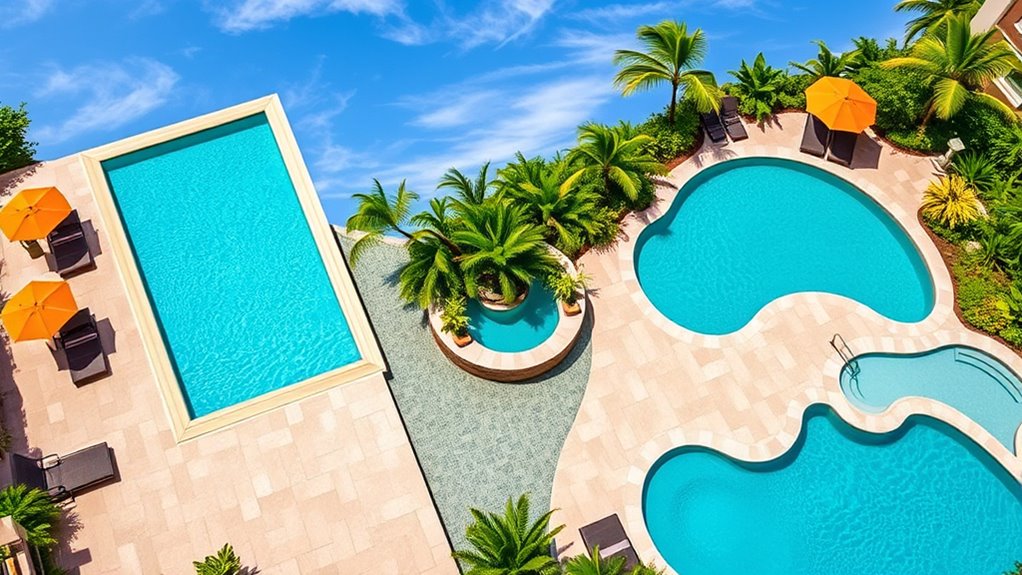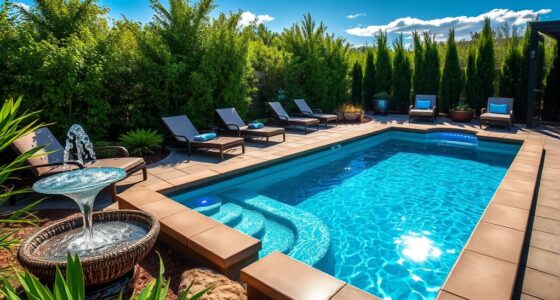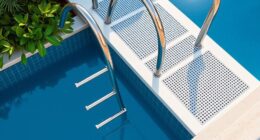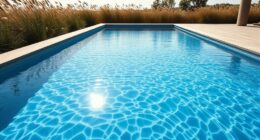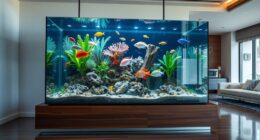Choosing the right pool shape depends on your backyard space, style, and needs. Rectangular pools offer a sleek, modern look and are easier to maintain, perfect for swimming laps. Kidney-shaped pools blend naturally with landscaping and add visual interest, while freeform designs mimic lakes or ponds for a relaxed vibe. Each shape impacts installation, maintenance, and aesthetics. Exploring these options further helps you find the perfect match for your outdoor oasis.
Key Takeaways
- Rectangular pools offer a sleek, customizable design with straightforward installation and easier maintenance.
- Kidney-shaped pools feature natural curves, blending well with landscaping but may trap debris, increasing cleaning needs.
- Freeform pools mimic natural ponds, providing a unique aesthetic but require detailed installation and diligent upkeep.
- Pool shape impacts installation complexity and maintenance efforts, with simple shapes being easier to care for over time.
- Choosing the right shape depends on backyard space, lifestyle, aesthetic preferences, and desired ease of maintenance.

Have you ever wondered how the shape of a pool can transform your backyard? Choosing the right pool shape isn’t just about aesthetics; it also influences how you approach pool installation and pool maintenance. Different shapes serve different needs and styles, so it’s essential to consider what fits your space and lifestyle best.
Rectangular pools are classic and versatile, making them a popular choice for many homeowners. They offer a sleek, modern look that complements various backyard designs. With a straightforward pool installation process, rectangular pools are easier to customize with features like built-in steps or diving boards. However, keep in mind that their clean lines can make cleaning and maintenance a bit more predictable, since debris tends to settle along the edges and bottom evenly. Regular skimming and brushing keep these pools looking pristine, and their simple shape means pool maintenance routines are usually easier to manage compared to more complex designs.
Rectangular pools offer sleek, modern design and easier maintenance with predictable debris collection.
Kidney-shaped pools introduce a softer, more natural look to your backyard. This shape can blend seamlessly into landscaped surroundings, creating a more organic feel. Their curves often provide more lounging space on one side while maintaining enough depth for swimming or water activities. When it comes to pool installation, kidney shapes might require more planning and precision to ensure the curves are smooth and functional. Maintenance can be slightly more involved due to the irregular edges, which can trap leaves or debris. Regular cleaning, along with checking water chemistry, helps keep these pools sparkling. The flowing shape also makes them ideal for incorporating features like waterfalls or rock formations, enhancing both aesthetics and fun.
Freeform pools take the cake if you want a more artistic, natural-looking backyard oasis. They usually mimic natural ponds or lakes, with flowing lines and irregular shapes. Installing a freeform pool involves a bit more design finesse, as you’ll work closely with your contractor to shape it precisely to fit your space. These pools are perfect for creating a relaxing environment, but they demand diligent pool maintenance. Their irregular edges and varied depths mean you’ll need to stay on top of skimming, brushing, and water testing to prevent algae and debris buildup. The unique shape also allows for creative landscaping and lighting options, making your backyard truly one-of-a-kind. Additionally, understanding high-quality pool design principles can help you achieve an aesthetically pleasing and functional result.
Whatever shape you choose, remember that proper pool installation sets the foundation for easier pool maintenance down the line. Selecting a shape that complements your space, lifestyle, and aesthetic preferences ensures you’ll enjoy your pool for years to come with less hassle and more relaxation.
Frequently Asked Questions
Which Pool Shape Is Easiest to Maintain?
You want a pool that’s easiest to maintain, and shape durability plays a big role. Generally, simpler shapes like rectangular pools offer better maintenance simplicity because they have fewer corners and curves where debris can hide. These shapes are easier to clean and balance chemicals in, making upkeep straightforward. So, choosing a shape with fewer intricate features will help you enjoy your pool more and spend less time on maintenance.
How Do Pool Shapes Affect Water Circulation?
Perfect pools promote prime water flow, preventing poor circulation problems. Your pool’s shape considerably influences water flow and circulation patterns. For example, simple shapes like rectangles typically foster straightforward circulation, while complex curves or irregular forms can create stagnant spots. By understanding how shapes affect flow, you can optimize pump placement and skimmer locations, ensuring consistent circulation. This keeps water clearer, healthier, and more inviting for everyone enjoying your pool.
Are Custom Shapes More Expensive to Build?
Custom shapes generally cost more to build because they require detailed design flexibility and precise construction, affecting your overall cost estimation. You’ll find that standard shapes are more straightforward and less expensive, whereas unique designs demand extra labor and materials. If you want a personalized pool that fits your space and style, be prepared for higher costs due to the complexity of the design and construction process.
Can a Pool Shape Influence Backyard Aesthetics?
They say beauty is in the eye of the beholder, and your pool shape definitely influences your backyard’s aesthetic appeal. Choosing a shape that complements your landscape and existing design creates harmony and elevates your outdoor space. Whether you opt for sleek rectangular lines or a flowing freeform, your pool’s shape sets the tone. It’s a key element that can make your backyard feel more inviting and visually cohesive.
Which Shapes Maximize Swimming Space?
You want to maximize swimming space, so consider your pool’s shape carefully. Shapes like rectangular pools often provide the most open area for swimming. Keep in mind, pool depth and safety considerations are vital—deeper areas should be clearly marked, and safe entry points are essential. Choosing a shape that suits your space and safety needs guarantees you get the most functional swimming area while maintaining a safe environment.
Conclusion
Choosing the right pool shape is like designing a tailored suit—every detail reflects your style and needs. Whether you pick a sleek rectangle or a flowing freeform, remember that your pool becomes a personal oasis, shaping memories and relaxation. Think of it as planting a seed; with care and the right shape, it grows into a beautiful centerpiece that transforms your backyard into a sanctuary. Make your choice wisely, and enjoy the endless possibilities ahead.
